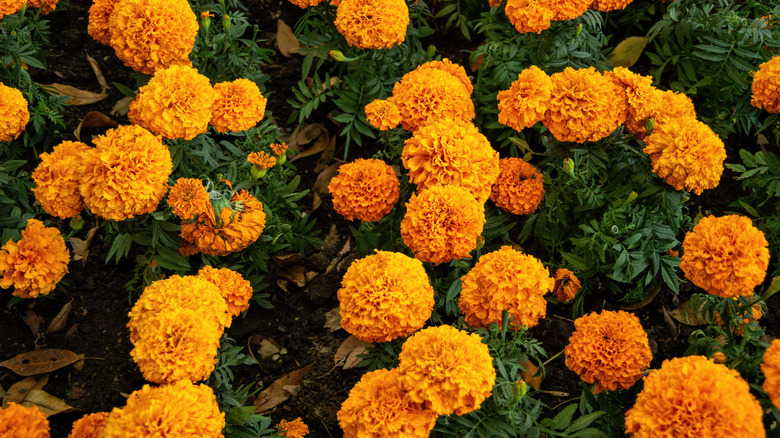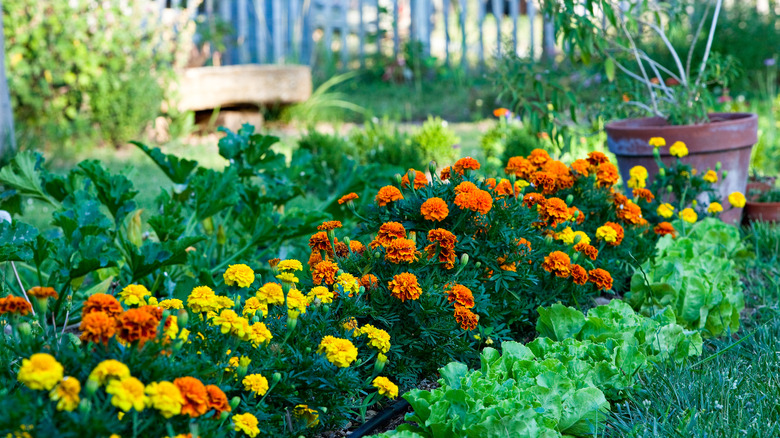Ward Off Pests For Good With This Gorgeous Yellow Plant
Marigolds are often celebrated for their vibrant flowers and ease of care, but they offer more than just visual appeal. These hardy plants are a natural and effective way to ward off a wide variety of garden pests, making them an essential tool for gardeners seeking to protect their plants without resorting to chemical pesticides. The secret to marigolds' pest-repelling power lies in the unique compounds they produce, particularly in their roots and leaves. One such compound is thiophene, a natural chemical that has insecticidal properties, effectively deterring pests like nematodes, aphids, and certain beetles. When these pests come into contact with marigolds, they are either repelled or significantly slowed in their development, reducing the damage they can inflict.
In vegetable gardens, marigolds serve as a powerful ally. Their ability to deter nematodes is particularly valuable, as these microscopic worms can cause severe damage to the roots of many garden vegetables, leading to reduced yields. By planting marigolds alongside your vegetables, you create a natural barrier that helps keep these pests at bay. Marigolds also work exceptionally well when planted near roses, as they help protect these delicate flowers from aphids and other common garden invaders.
Beyond their pest control benefits, marigolds have therapeutic qualities that make them even more appealing. The flowers have been used in traditional medicine for their anti-inflammatory and antiseptic properties, and the mere presence of these bright blooms can enhance the overall well-being of a garden space.
Strategic planting of marigolds enhances their pest-repelling power
One of the reasons marigolds are so effective in organic gardening is their ability to attract beneficial insects, which play a crucial role in pest control. For example, marigolds are known to attract butterflies and hoverflies, both of which are natural predators of aphids and other soft-bodied insects. By encouraging these helpful insects to take up residence in your garden, marigolds help establish a balanced ecosystem where harmful pests are kept in check naturally.
In addition to attracting beneficial insects, marigolds release compounds from their roots and leaves that inhibit the growth of certain weeds and soil-borne pathogens. This natural allelopathy is particularly valuable in organic gardening, where controlling weeds and diseases without chemicals can be challenging. Marigolds can be used as living mulch, their dense foliage shading the soil and suppressing the growth of competing weeds. This makes them an excellent companion plant for crops that are susceptible to weed competition.
Moreover, marigolds can play a role in improving soil health, a key principle of organic gardening. Their deep-rooted systems help aerate the soil, improving its structure and promoting better water retention. This is particularly beneficial in areas with heavy clay soils, where compaction can be an issue. Marigolds also offer a non-toxic option for gardeners looking to protect their plants from pests in a safe, environmentally friendly way. For those growing edible crops, the use of marigolds ensures that no harmful residues are left on fruits and vegetables.
Incorporating marigolds into a diverse garden ecosystem
Marigolds support garden biodiversity by providing nectar and pollen for pollinators like bees, butterflies, and other beneficial insects. These pollinators are crucial for the reproduction of many garden plants, particularly fruits and vegetables. The bright, accessible blooms of marigolds make them a favorite feeding spot for these insects, ensuring that your garden remains well-pollinated throughout the growing season. Marigolds also play a role in attracting predatory insects that help keep pest populations in check. For example, lacewings and parasitic wasps are drawn to marigolds and can help control aphids, caterpillars, and other harmful insects. These predators are an important part of a natural pest management system, reducing the need for chemical interventions. By fostering a habitat that supports these beneficial predators, marigolds contribute to a self-regulating garden ecosystem where pest outbreaks are less likely to occur.
Marigolds are easy to care for and thrive in full sun with well-drained soil. Plant them in a location that receives at least six hours of sunlight daily. Water marigolds regularly, allowing the soil to dry slightly between waterings. Also remember to avoid waterlogging, which can cause root rot. Deadhead spent flowers to encourage continuous blooming. Marigolds prefer moderately fertile soil but can tolerate poor conditions. Fertilize sparingly, as too much can lead to lush foliage at the expense of flowers. In hot climates, marigolds may need more frequent watering to stay healthy.


